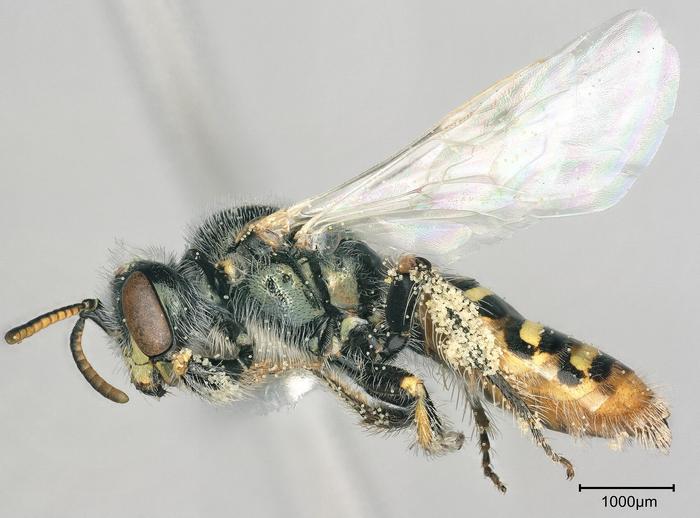LOGAN, Utah, July 1, 2024 – Scientists at the United States Department of Agriculture (USDA)’s Agricultural Research Service (ARS) and university research partners developed a near chromosome-level genome for the Mojave poppy bee, a specialist pollinator of conservation concern, according to a recent Journal of Heredity paper.

Credit: Michael Branstetter, USDA Agricultural Research Service
LOGAN, Utah, July 1, 2024 – Scientists at the United States Department of Agriculture (USDA)’s Agricultural Research Service (ARS) and university research partners developed a near chromosome-level genome for the Mojave poppy bee, a specialist pollinator of conservation concern, according to a recent Journal of Heredity paper.
Putting together the Mojave poppy bee genome is part of the Beenome100 project, a first-of-its-kind effort to create a library of high-quality, highly detailed genome maps of 100 or more diverse bee species found in the United States. Beenome100 is a collaborative undertaking led by ARS and the University of Illinois, with collaboration of researchers across ARS and universities in the United States and Canada. The expectation is that these genomes will help researchers answer the big questions about bees, such as what genetic differences make a bee species more vulnerable to climate change or whether a bee species is likely to be more susceptible to a pesticide.
Restricted to the eastern Mojave Desert, the Mojave poppy bee (Perdita meconis) is a solitary, mining bee of the Andrenidae family that specializes in pollinating the Las Vegas bearpoppy (Arctomecon californica) and the dwarf bearpoppy (Arctomecon humilis) — the latter being protected under the U.S. Endangered Species Act as of 1979. The poppies are found primarily in gypsum soil deposits, which are rare and scattered throughout the region.
The Mojave poppy bee and Las Vegas bearpoppy are also being considered for listing under the Endangered Species Act. Both species will be evaluated for potential declining populations and vulnerability to extinction due to climate change and to habitat loss from urban development and mining in their native region.
Researchers assembled the genome or genetic map that will help further to understand the Mojave poppy bee’s biological traits.
“The genome, with additional genetic sampling of individuals, will also potentially give us insights into the genetic basis for host-plant specialization, susceptibility to pesticides, and susceptibility to drought and climate tolerance,” said Rena Schweizer, a research entomologist at the ARS Pollinating Insect-Biology, Management, Systematics Research Unit in Logan, Utah.
In particular, the Mojave poppy bee is capable of weathering drought years by remaining in the ground in stasis — a phenomenon called diapause. The trait is not well understood by researchers and, by having its genome sequenced, they may be able to learn about the genes and regulatory pathways that make the adaptation possible.
They will also use the genome to assess the species’ genetic health, find insights into how bees can be specialists or generalists, and look what the tradeoffs are in terms of a bee’s long-term fitness.
“It could also lead to us finding genetic signatures of decline,” said Schweizer. “By studying this one bee’s genome, we might be able to help conserve the bee better and identify other species that are in decline using genetic information.”
To develop the genome of the small and mighty bee, researchers isolated DNA from a single, small male specimen.
This genome assembly, according to Schweizer, is impressive given that the bee is tiny (a male bee averages five to seven millimeters in length). Researchers collected the specimen in the field in a remote wilderness location.
“What is also remarkable about this research is that the specimen used for the genome was collected in non-ideal preservation methods,” said Schweizer. “We still obtained high-quality DNA from a field-collected specimen due to technological advancements in sequencing technology and learned more about this unique bee. We hope that our research will set the groundwork for developing genomes of other bee species.”
The detailed, high-resolution map of the reference genome is available in the National Center for Biotechnology Information’s database.
The research was done in collaboration with the University of Montana, Utah State University, and the ARS Tropical Pest Genetics and Molecular Biology Research Unit in Hilo, Hawaii.
The Agricultural Research Service is the U.S. Department of Agriculture’s chief scientific in-house research agency. Daily, ARS focuses on solutions to agricultural problems affecting America. Each dollar invested in agricultural research results in $20 of economic impact.
###
Journal
Journal of Heredity
Method of Research
Experimental study
Subject of Research
Animals
Article Title
Reference genome for the Mojave poppy bee (Perdita meconis), a specialist pollinator of conservation concern
Article Publication Date
13-Dec-2023



